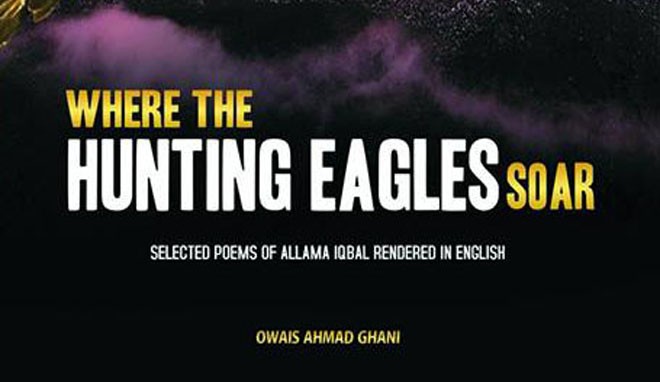
Where the Hunting Eagles Soar is a brilliant effort by Owais Ahmed Ghani to highlight the universality of Iqbal’s poetry

The book, Where the Hunting Eagles Soar, is a unique and brilliant effort by Owais Ahmed Ghani, ex-governor of Balochistan and NWFP/KPK, to highlight the universality of Allama Iqbal’s poetry into English.
Having selected 51 poems from Iqbal’s four books, Baal-e-Jibreel, Bang-e-Dara, Zarb-e-Kaleem and Armaghan-e-Hizaz, majority from Baal-e-Jibreel, the writer beautifully translates each in lyrical style.
Owais Ahmed Ghani, a mechanical engineer by profession, says in his author’s note that he seems to have been inspired by Iqbal’s poems when he was very young.
To him, the poetry of Iqbal touches upon modernism, materialism, symbolism and spiritualism, and at times combing one with another. This combination is a vision for Muslims.
The writer claims that understanding Iqbal is essential for today’s generation to face the challenges of life. Iqbal had special message for youth.
The first poem selected for translation is from Baal-e-Jibreel "Aik Nojawan Ke Nam" as "Message for Muslim Youth. He translates the last verse as
Nesting in palace walls, my Boy, behoves you now no more
Your home is in craggy mountains high where the hunting eagles soar.
One of the poems of Iqbal he translates under the title: Call to Arms
The priests in the mosques have faithless souls,
Their prayes too are as soulless as rocks,
Stand not head bowed in these soulless prayers
Let not such priests enter your mosques
New quests, new journeys are thy wine,
Drink not at any wayside inn,
Take not mansions for thy abode’
Even if fair Leila beckons thee in
The dawn that we daily view on every morn,
We know not and we care not whence and why it is born,
The dawn that leaves dark false gods fearful and forlorn,
Rises with the true Muslim’s clarion call of early morn.
The book shows a master print. Simultaneously, it seems a picture-book to explain the historical and societal background of each poem. Printed in local press with each page in matt quality paper, the book is decorated in artistry to support the glory of Iqbal’s poetic wisdom. Every poem in background has a related sketch of events/action which raises the interests of readers to go deeper into the words. For example, the poem Rohilla, Afghan Warrior, is shown in background with Rohilla as conqueror sitting on a cushion while royal princesses dancing in the front.
Similarly, one of the poems Khushal Khan Khattak’s Will from Baal-e-Jibreel has in background a Pashtun warrior showing his will against slavery. Eagle, a symbol of freedom and greedless spirit in Iqbal’s poetry, is visible in many sketches.